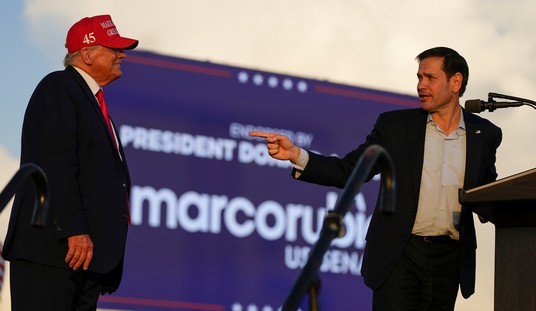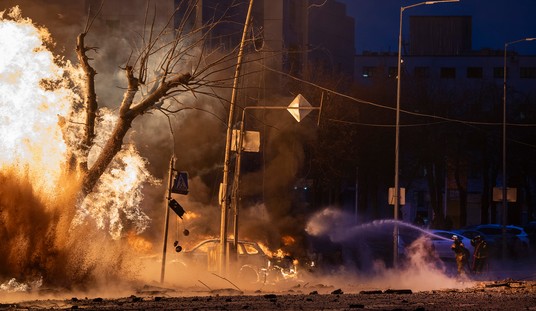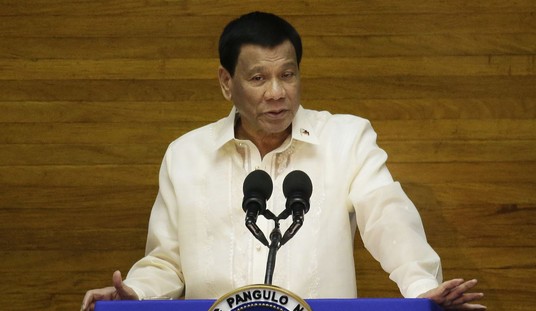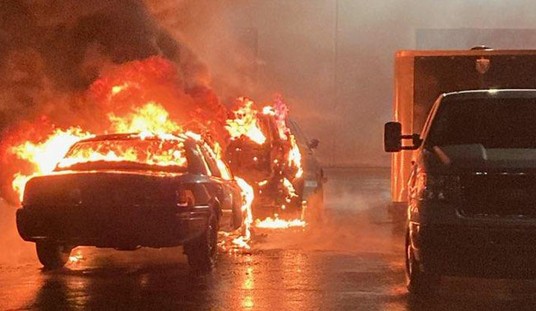A vote of no confidence may soon be on the horizon in the UK as three ministers resigned abruptly over the last few hours over the Brexit compromise pushed by Theresa May. The latest and most significant of those resignations came from Foreign Secretary Boris Johnson, a key hardliner on Brexit within May’s government:
British Foreign Secretary Boris Johnson quit Monday, just hours after the Brexit secretary also resigned, plunging PM Theresa May’s government into a deep crisis.
The latest bumps on the U.K.’s road to Brexit come just days before President Donald Trump is due to meet May on his official visit to London.
Johnson stepped down after two of the most senior ministers in charge of negotiating the country’s exit from the European Union quit overnight — days after May claimed she had finally united her squabbling government behind a strategy on the issue.
The midnight resignations of Brexit Secretary David Davis and junior Brexit minister Steve Baker triggered another round of open warfare within her ruling Conservatives, with some party colleagues calling for May to be replaced Monday.
It was bad enough when Brexit Secretary David Davis resigned last night. May quickly replaced him with another Tory, and Davis reportedly said that he didn’t want May’s leadership challenged. Johnson’s resignation changes those dynamics, the Guardian points out:
[D]espite numerous Tory Brexiters taking to the airwaves denouncing May’s Brexit plan, we had not heard any calls for her departure. That was because, with most cabinet ministers supporting her, it seemed very likely that May would win a confidence vote hansomely.
Now, though, the Brexiters have got an alternative candidate – assuming Johnson does mount a leadership challenge. Whether he will or not is unclear at this point; as I write, we have not heard any statement from Johnson. And, after the Heathrow expansion vote no-show and Johnson’s decision to back May’s plan at Chequers on Friday after telling cabinet ministers that doing so amounts to “polishing a turd”, Johnson is a diminished figure. But he has wanted to be prime minister since he was a child (or “king of the world”, as he described his goal then) and this is probably he last chance. A challenge does seem very likely.
Could he win? It would be very hard. Only 129 Conservative MPs voted leave – less than half – and even many of those have reservations about the hard Brexit vision set out by Johnson, which the cabinet comprehensively rejected on Friday. Also, amongst colleagues, trust in Johnson is low. Johnson is popular with Conservative party members. But they would only get to vote in a leadership contest if May were to lose a vote of confidence, and May is reportedly keen to fight and win such a contest.
Both should be careful what they wish for. The problem with Brexit is that it’s an impractical policy, thanks mostly to the shared border between the Republic of Ireland and Northern Ireland, which thanks to the EU has been open since the Good Friday Agreement in 1998. Dublin insists that it remain open in order to prevent undermining the fragile peace agreement; it’s so fragile that Northern Ireland hasn’t been able to establish an executive for more than a year, thanks to deep divisions in the six counties. The EU insists that it will not agree to any plan which establishes a hard border in the Emerald Isle, and May’s reliance on the DUP has forced her to attempt half-measures in order to get a deal.
It’s those half-measures, such as pledges to align with EU trading policies, that infuriated Brexit hardliners like Johnson and Nigel Farage. Farage last night called for Johnson to be a “hero” and resign, a call which Johnson apparently took to heart. It seems doubtful that Johnson wants to become a backbencher while May’s government negotiates a complicated Brexit settlement.
So what’s next? The backbenchers may be collecting signatures for a no-confidence vote to trigger a leadership fight among Tories:
A leadership challenge can be triggered if 15 percent of members of parliament in May’s Conservative Party write a letter to the chairman of the party’s so-called “1922 committee”.
The Conservatives currently have 316 members of parliament (MPs) so 48 of them would need to write such letters to challenge May.
Once that threshold has been reached, the chairman will announce the start of the contest and invite nominations.
The first vote would be an up-or-down on May’s leadership. If she wins that, nothing changes, except the hard-Brexit contingent will lose some standing and May will have a clearer road ahead for negotiations. If May loses, however, she will be barred from competing in the next round to elect a new leader and Prime Minister, and depending on how many jump in the race, it might take several rounds to choose the new leader. Johnson may well see this as his best chance to take over the reins, assuming May loses in the first vote. If she wins, Johnson may find himself locked out for a very long time.
May argued that the Chequers deal, as her Brexit compromise has become known, is the proper path for Brexit. Her counterpart in Ireland gave a qualified thumbs-up to the deal:
UK PM Theresa May addresses House of Commons on Brexit after resignation of two of her ministers: "We do not agree about the best way of delivering our shared commitment to honoring the result of the referendum" https://t.co/xkS8QqVSrP pic.twitter.com/yYmF95pqOi
— CNN International (@cnni) July 9, 2018
The prime minister said she disagreed with Mr Davis’s characterisation of the Chequers deal.“I am sorry that the government will not have the benefit of your continued expertise and counsel as we secure this deal and complete the process of leaving the EU, but I would like to thank you warmly for everything you have done over the past two years as Secretary of State to shape our departure from the EU, and the new role the UK will forge on the world stage as an independent, self-governing nation once again,” she said. …
Mr Varadkar said the UK must be a full member of the European Single Market, or else stay out of it entirely, in response to Ms May’s latest Brexit plan. He gave a cautious welcome to the deal agreed by the British cabinet, which he hailed as a “real political success” for Ms May.
But he added that he had “some concerns about the workability of the UK’s customs” proposals and the plan’s effect on the integrity of the single market.
The Chequers deal got a chillier reception from the American ambassador:
BREAKING Bad news for No 10. US ambassador Woody Johnson tells @5liveSport Brexit trade deal ‘up in the air’ following Chequers compromise. ‘I would say that the bilateral agreement, whether we have one or not, is totally up in the air at this point’
— Steven Swinford (@Steven_Swinford) July 9, 2018
That’s a rare moment of clarity from the Trump administration, which hasn’t done much to help out May in this effort. Despite the deal’s crisis being the Irish border and the Good Friday agreement, Donald Trump hasn’t appointed an ambassador to Dublin yet, nor has it named a Northern Ireland envoy to deal with our GFA obligations. Last week, the man presumed to be Trump’s choice as US Ambassador to Ireland abruptly pulled out of consideration. If the president and Secretary of State Mike Pompeo want to be at the table to shape the events surrounding Brexit, they need to start appointing people to these critical posts before events outstrip us.
Of course, the issue could be moot. If May’s government falls, there’s at least a possibility that the next government might not move forward on Brexit at all. That’s what EU president Donald Tusk would clearly prefer:
Politicians come and go but the problems they have created for people remain. I can only regret that the idea of #Brexit has not left with Davis and Johnson. But…who knows?
— Charles Michel (@eucopresident) July 9, 2018
May will be in for the fight of her life in the next few weeks. When the dust clears, what course will the UK steer? “Who knows” is as good an answer as any.
Update: This didn’t take long, if true:
Whispers Tory MP s have reached the magic number of the 48 letters required to force a confidence vote – no way of knowing yet if true – meeting at 5.30
— Laura Kuenssberg (@bbclaurak) July 9, 2018
PM asked in Commons about reports that the 48 letters have gone in, i.e. she faces vote of no confidence. Reacts like she's been asked about the weather. This is actually now kind of weird.
— gabyhinsliff (@gabyhinsliff) July 9, 2018
Getting the votes for the challenge is a long way from winning the challenge — but it’s at least the first step towards it.
Update: The BBC presents Johnson’s resignation in full. The takeaway — he’s running:
Resignation statement in full from @BorisJohnson
Live reaction: https://t.co/w4wKJ0BcTD pic.twitter.com/9UCCX8X7hv
— BBC Breaking News (@BBCBreaking) July 9, 2018
“In that respect,” Johnson declares, “we are truly headed for the status of colony.” Don’t think that won’t have an impact.








Join the conversation as a VIP Member